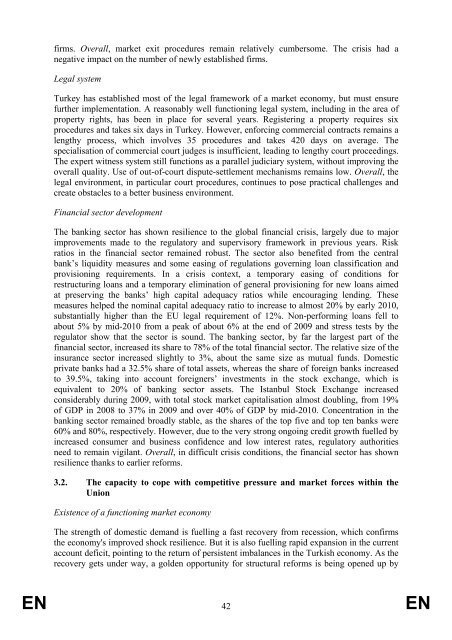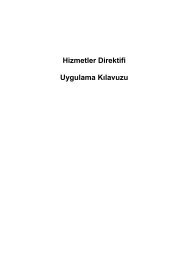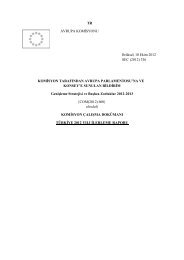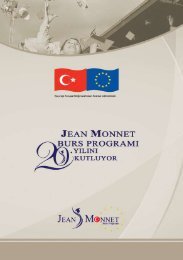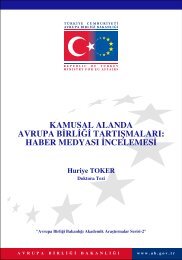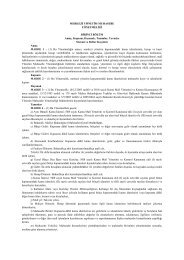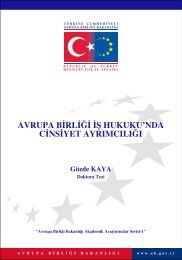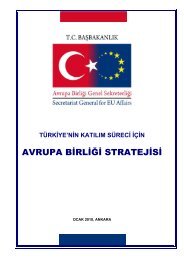2010 ilerleme raporu - Avrupa Birliği Bakanlığı
2010 ilerleme raporu - Avrupa Birliği Bakanlığı
2010 ilerleme raporu - Avrupa Birliği Bakanlığı
You also want an ePaper? Increase the reach of your titles
YUMPU automatically turns print PDFs into web optimized ePapers that Google loves.
firms. Overall, market exit procedures remain relatively cumbersome. The crisis had anegative impact on the number of newly established firms.Legal systemTurkey has established most of the legal framework of a market economy, but must ensurefurther implementation. A reasonably well functioning legal system, including in the area ofproperty rights, has been in place for several years. Registering a property requires sixprocedures and takes six days in Turkey. However, enforcing commercial contracts remains alengthy process, which involves 35 procedures and takes 420 days on average. Thespecialisation of commercial court judges is insufficient, leading to lengthy court proceedings.The expert witness system still functions as a parallel judiciary system, without improving theoverall quality. Use of out-of-court dispute-settlement mechanisms remains low. Overall, thelegal environment, in particular court procedures, continues to pose practical challenges andcreate obstacles to a better business environment.Financial sector developmentThe banking sector has shown resilience to the global financial crisis, largely due to majorimprovements made to the regulatory and supervisory framework in previous years. Riskratios in the financial sector remained robust. The sector also benefited from the centralbank’s liquidity measures and some easing of regulations governing loan classification andprovisioning requirements. In a crisis context, a temporary easing of conditions forrestructuring loans and a temporary elimination of general provisioning for new loans aimedat preserving the banks’ high capital adequacy ratios while encouraging lending. Thesemeasures helped the nominal capital adequacy ratio to increase to almost 20% by early <strong>2010</strong>,substantially higher than the EU legal requirement of 12%. Non-performing loans fell toabout 5% by mid-<strong>2010</strong> from a peak of about 6% at the end of 2009 and stress tests by theregulator show that the sector is sound. The banking sector, by far the largest part of thefinancial sector, increased its share to 78% of the total financial sector. The relative size of theinsurance sector increased slightly to 3%, about the same size as mutual funds. Domesticprivate banks had a 32.5% share of total assets, whereas the share of foreign banks increasedto 39.5%, taking into account foreigners’ investments in the stock exchange, which isequivalent to 20% of banking sector assets. The Istanbul Stock Exchange increasedconsiderably during 2009, with total stock market capitalisation almost doubling, from 19%of GDP in 2008 to 37% in 2009 and over 40% of GDP by mid-<strong>2010</strong>. Concentration in thebanking sector remained broadly stable, as the shares of the top five and top ten banks were60% and 80%, respectively. However, due to the very strong ongoing credit growth fuelled byincreased consumer and business confidence and low interest rates, regulatory authoritiesneed to remain vigilant. Overall, in difficult crisis conditions, the financial sector has shownresilience thanks to earlier reforms.3.2. The capacity to cope with competitive pressure and market forces within theUnionExistence of a functioning market economyThe strength of domestic demand is fuelling a fast recovery from recession, which confirmsthe economy's improved shock resilience. But it is also fuelling rapid expansion in the currentaccount deficit, pointing to the return of persistent imbalances in the Turkish economy. As therecovery gets under way, a golden opportunity for structural reforms is being opened up byEN 42 EN


